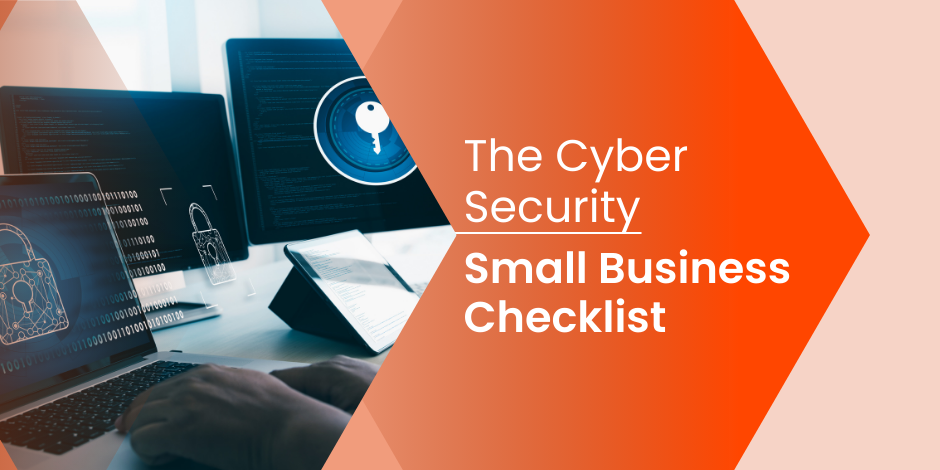Cyber Security Checklist for Small Business

Stay Informed With Our Weekly Newsletter
Receive crucial updates on the ever-evolving landscape of technology and innovation.
In today’s digital age, small businesses face increasing cyber criminals threats.
Small business owners must understand the importance of implementing strong cyber security measures to protect their company and its valuable data.
Read on to learn more about why it’s essential to incorporate a cyber security checklist for small businesses.
Understanding the importance of cyber security for small businesses

Small organisations are not immune to cyber threats and are often easier targets due to limited resources and less emphasis on security measures.
The cyber security checklist for small businesses provides them with a guideline for protecting their digital assets from these cyber attacks.
Awareness of the consequences of a cyber attack is the first step towards establishing a robust cyber security foundation.
Such attacks can lead to financial losses, reputational damage, and potential legal consequences.
By investing in cyber security measures, small organisations can protect their data, maintain the trust of their customers, and ultimately safeguard their company’s future.
Cyber security checklist for small business: the potential impact
The costs after a cyber attack can be far-reaching and include expenses related to investigating the incident, restoring systems, notifying customers or clients, and implementing enhanced security measures.
Reputational damage is another significant consequence of a cyber attack. Small organisations rely on their reputation to attract and retain customers.
A security breach affects the confidence of existing customers and may deter potential customers from engaging with the business.
Moreover, data breaches can result in legal action, fines, and penalties.
Referring to a cyber security checklist for small businesses will ensure compliance with laws and regulations relating to data protection.
Cyber security checklist for small business: why small businesses a target
Cyber criminals often view small businesses as easy targets due to several factors, including:
- Limited resources: Cyber criminals often seek to exploit a perceived lack of investment and vulnerabilities in their systems.
- Expertise and dedicated staff: Inadequate security practices and skilled staff increase cyber attack vulnerability.
- Valuable data: Cyber criminals specifically target small organisations to gain access to valuable data and exploit it for financial gain.
Establishing a strong cyber security foundation
To effectively protect your small business from cyber threats, it is imperative to establish a strong cyber security foundation.
This foundation starts with implementing basic security measures that can significantly reduce the risk of an attack.
Cyber security checklist for small business: the role of passwords
Effective passwords should be:
- Strong and unique.
- Complex, including upper and lowercase letters, numbers, and special characters.
- Regularly changed and not reused across multiple accounts.
- Managed by a password management tool that securely stores and generates unique accounts’ passwords.
Cyber security checklist for small business: regular software updates
Regular software updates play an essential role in maintaining the security of your small business’s computer systems.
Software vendors frequently release updates that address security vulnerabilities and patch known issues.
Cyber criminals can exploit these vulnerabilities to gain unauthorised access to your systems.
It is essential to promptly install software updates to protect your systems from the latest threats.
Consider enabling automatic updates whenever possible to simplify the process and reduce the chances of overlooking critical security updates.
Implementing advanced security measures

While basic security measures are essential, small businesses should also consider implementing advanced security measures to strengthen their cyber security further.
These measures provide an extra layer of protection and make it even more challenging for cyber criminals to infiltrate your systems.
Cyber security checklist for small business: multi-factor authentication
Multi-factor authentication (MFA) is a method that requires users to provide additional evidence, in addition to a password, to prove their identity.
This additional evidence can be a unique code from a trusted authentication app, a fingerprint scan, or a physical security token.
MFA significantly enhances security by reducing the risk of unauthorised access, even if passwords are compromised.
Cyber security checklist for small business: secure networks and vpns
Small businesses often rely on networks for their daily operations.
However, unsecured networks pose significant risks as they can be easily accessed by cyber criminals.
Securing your small business’s network is crucial by implementing strong encryption protocols, such as Wi-Fi Protected Access or higher.
This helps prevent access and protects the confidentiality of data transmitted over the network.
Additionally, utilising a Virtual Private Network (VPN) can provide an extra layer of security when accessing resources remotely.
VPNs encrypt traffic, ensuring that data sent and received remains confidential and secure, even when using public or untrusted networks.
Educating your team about cyber security
There needs to be more than investing in cyber security measures; educating your employees about cyber security best practices is equally important.
Employees play an essential role in maintaining the overall security of your small business.
They are the first defence against potential cyber threats and can help detect and prevent security breaches.
Cyber security checklist for small business: the role of employees
Employees should receive training on identifying and responding to phishing attempts, which are common tactics cyber criminals use to obtain sensitive information.
Regular training sessions can help employees recognise the signs of a phishing email or website and avoid falling victim to such attacks.
It is important to emphasise the significance of reporting suspicious activity to the appropriate IT personnel or security team.
Prompt reporting can help identify potential security breaches and mitigate their impact.
Cyber security checklist for small business: create a culture of awareness
Creating a culture of security awareness within your small business is essential for maintaining an effective cyber security posture.
Encourage employees to be proactive and vigilant when it comes to cyber security.
This can be achieved by promoting regular security awareness training, conducting simulated phishing exercises, and rewarding employees who demonstrate good security practices.
Planning for the worst: creating a cyber security incident response plan

No matter how strong your cyber security measures are, it is impossible to eliminate the risk of a cyber attack completely.
Therefore, it is crucial to have a comprehensive cyber security incident response plan in place. This plan will enable your small business to respond quickly and effectively to security breaches.
Cyber security checklist for small business: an effective response plan
A cyber security response plan should outline the roles and responsibilities of key personnel within your small business during a security incident.
This includes designating a response team, establishing communication channels, and defining escalation procedures.
The plan should also include incident detection and response processes.
This involves regularly monitoring and assessing your systems to identify potential threats or breaches.
Cyber security checklist for small business: maintaining an effective plan
An incident response plan is not a set-it-and-forget-it document. It should be regularly reviewed, tested, and updated to ensure effectiveness.
Regular testing through simulated exercises and tabletop scenarios can help identify any weaknesses in the plan, allowing for adjustments and improvements.
Furthermore, staying informed about the latest trends is essential as cyber threats evolve.
Conclusion
Small businesses must prioritise cyber security to protect their company and its valuable assets.
Small businesses can effectively mitigate the risks and safeguard their future by implementing a comprehensive incident response plan.
Remember, cyber security is an ongoing process that relies on continuous evaluation and improvement to stay one step ahead of cyber criminals.
That is why it is important to stay proactive in protecting your business by regularly revisiting a cyber security checklist for small business.
Ready to launch your cyber security career?
The Institute of Data’s Cyber Security program offers a practical, real-world curriculum taught by industry-experienced professionals.
We’ll support your learning with flexible learning options and extensive resources to help you maximise your certification.
Want to learn more about our Cyber Security program? Our local team is ready to give you a free career consultation. Contact us today!




